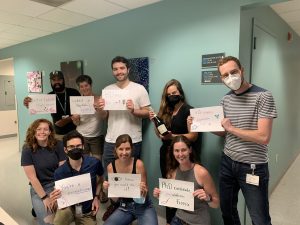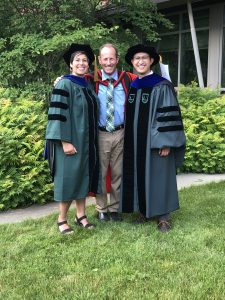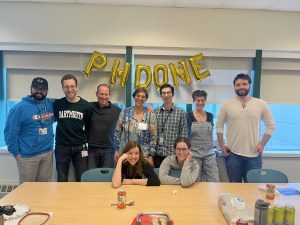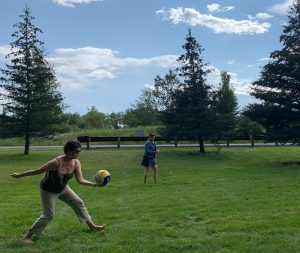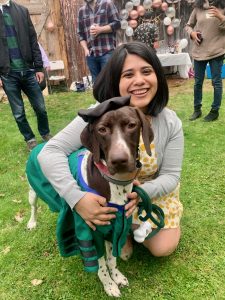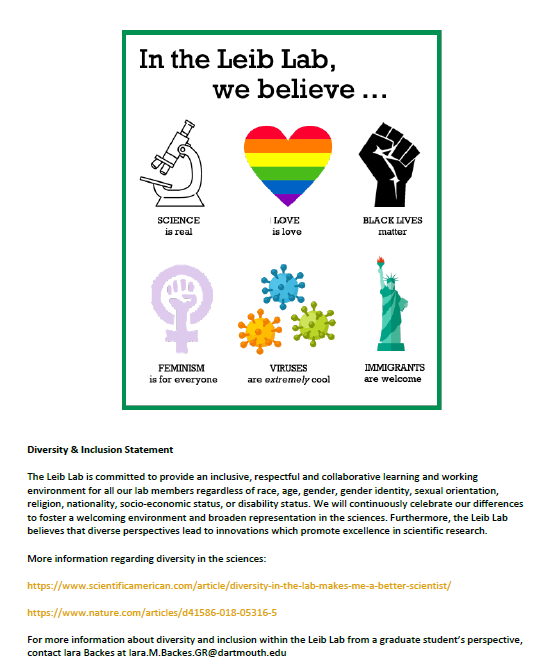Leib Laboratory
Featured
-
Neonatal HSV-1 causes anxiety-like behavior in mice
In mice, neonatal HSV-1 infection triggers behavior changes as measured by the elevated plus maze. However, maternal immunization with an experimental HSV-2 trivalent glycoprotein vaccine prevents disseminated disease and anxiety-like behavior in infected offspring, as exemplified by the confident mouse in this image. Image captured by Sean Taylor and designed by Chaya Patel.
-
HSV-1 US11 Promotes Neuroinvasion and Periocular Replication
This image shows human corneal epithelial cells infected with a mixture of HSV-1 (purple) and a mutant lacking these genes (Δ34.5Δ11, green). Cells infected with Δ34.5Δ11 show elevated levels of phosphorylated eIF2α (orange) relative to cells infected with wild-type HSV-1. Captured by Audra Charron.
-
HSV-specific IgG in the fetal nervous system
Photostitched fluorescent microscopy image of a human fetal trigeminal ganglion stained for IgG (green) and DNA (blue). Captured by Yike Jiang.
-
HSV-1 infection in primary neuron culture
Sensory trigeminal ganglia (TG) neurons ((labeled by βIII-tubulin, red) are capable of responding to IFN-β, but the intrinsic IFN-driven response to infection is not sufficient to control herpes simplex virus 1 (HSV-1) replication (green). Captured by Pamela Rosato.
News
Congratulations to Fiona McEnany for passing her qualifying exam on August 3rd, 2022! We are thrilled for her success and thrilled for the excuse to celebrate with viral puns, swimming, washers, and cheer.
Congratulations graduates! Richard and Iara were robed and regaled on June 11th, 2022. Just look at those good looking PhDs:
Congratulations to Matt Slein for passing his qualifying exam on June 8th, 2022! To no one’s surprise, he passed with flying colors and lots and lots of virology fun facts 🙂
Congratulations to Iara Backes for successfully defending her thesis on February 28th!
Congratulations to Roberto Alers-Velazquez for being accepted to Cornell’s Rising Star Program! A STAR pumpkin carver and know a nationally recognized star postdoc! Read more HERE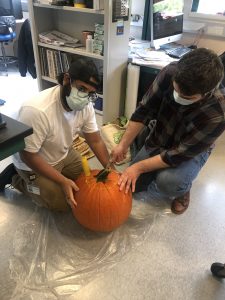
Congratulations to Fiona McEnany for being selected as New Hampshire’s Young Person of the Year! First New Hampshire, next The World… [Read more HERE].
Congratulations to Abigail Dutton for passing her qualifying exam on July 23rd, 2021. Congratulations also to her lab for immediately reminding Abigail of her humility in a daring game of volleyball (nice moves, Audra!).
Congratulations to Stacey Ceron for winning the Guarini Diversity Award, 2021. You are so deserving and we are so proud! Read more here.
Congratulations to Stacey Ceron for successfully defending her thesis on May 4th, 2021!
Congratulations to Chaya Patel for successfully defending her thesis on November 10th.
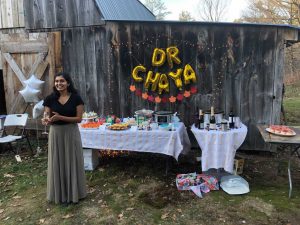
Read all about the the Leib Lab’s efforts on rapid COVID-19 diagnostics.

Research
Herpes simplex virus (HSV) is a highly evolved and successful pathogen with a very wide distribution in the human population, close to 100% in some populations. HSV often manages to forge the near-perfect lifelong relationship with us, its human host. Despite the availability of excellent antiviral drugs such as acyclovir and valtrex, HSV is refractory to cure. This is due to the ability of HSV to invade neurons, to translocate to neuronal cell bodies, and establish latent infections therein. Our over-arching interest is to understand how HSV modulates the immune system of the host. This immune-modulation allows HSV to successfully establish latency, and more remarkably, to allow the virus to escape from the immune host to infect other susceptible individuals in the population. Our experimental approach is to use forward and reverse genetics to introduce mutations into the viral genome to generate recombinant viruses. We then use these recombinant viruses in vitro and in vivo to allow the study of viral pathogenesis at the molecular level, and to examine the outcome of the host-pathogen battle.
Recent Publications
Effector functions are required for broad and potent protection of neonatal mice with antibodies targeting HSV glycoprotein D.
Slein MD, Backes IM, Garland CR, Kelkar NS, Leib DA, Ackerman ME
Cell Rep Med. 2024 Feb 20;5(2):101417. doi: 10.1016/j.xcrm.2024.101417. Epub 2024 Feb 12.
PMID: 38350452
Antibody effector functions are required for broad and potent protection of neonates from herpes simplex virus infection.
Slein MD, Backes IM, Garland CR, Kelkar NS, Leib DA, Ackerman ME
bioRxiv. 2023 Aug 31; pii: 2023.08.29.555423. doi: 10.1101/2023.08.29.555423. Epub 2023 Aug 31.
PMID: 37693377
Maternally transferred mAbs protect neonatal mice from HSV-induced mortality and morbidity.
Backes IM, Byrd BK, Slein MD, Patel CD, Taylor SA, Garland CR, MacDonald SW, Balazs AB, Davis SC, Ackerman ME, Leib DA
J Exp Med. 2022 Dec 5;219(12) doi: 10.1084/jem.20220110. Epub 2022 Sep 26.
PMID: 36156707
